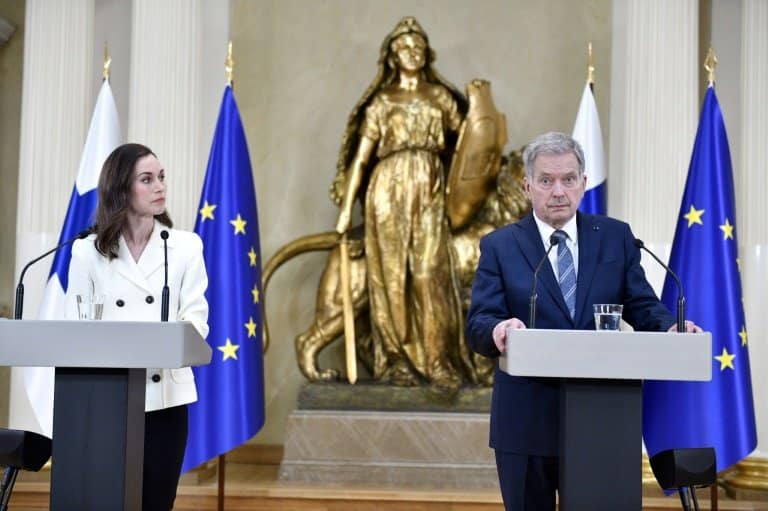Sweden, Finland take ‘historic’ steps toward NATO membership

Finland officially announced its intention to join NATO on Sunday as Sweden’s ruling party said it backed membership, paving the way for a joint application.
Less than three months after Russia invaded Ukraine, the announcements are a stunning reversal of the two Nordic countries’ military non-alignment policies, dating back more than 75 years for Finland and two centuries for Sweden.
Public and political support for NATO membership has surged in Finland and Sweden in recent months, and they are widely expected to submit applications this week.
“The best thing for Sweden’s security is that we apply for membership now, and that we do it with Finland,” Social Democratic Prime Minister Magdalena Andersson said several hours later in Stockholm.
The turnaround by her party, which has opposed NATO membership since the birth of the alliance, secures a firm majority in Sweden’s parliament in favour of joining.
Andersson said nonetheless that she would consult parliament on Monday before announcing her government’s official intention to apply.
The issue had divided the Social Democrats, with some members expressing concern that the decision was being rushed through.
If Sweden’s application were approved, the party would work to express “unilateral reservations against the deployment of nuclear weapons and permanent bases on Swedish territory”, it said in a statement.
According to recent polls, the number of Finns who want to join the alliance has risen to more than three-quarters, almost triple the level seen before the war in Ukraine began on February 24.
Support in Sweden has also risen dramatically, to around 50 percent — with about 20 percent against.
NATO membership needs to be approved and ratified by all 30 members of the alliance.
Turkey’s President Recep Tayyip Erdogan has expressed last-minute objections, but NATO Secretary General Jens Stoltenberg said Sunday that Ankara was not opposed to the two countries’ bids.
“Turkey made it clear that its intention is not to block membership,” Stoltenberg told reporters virtually after alliance foreign ministers met in Berlin.
“I am confident we’ll be able to find common ground, consensus on how to move on membership issues,” Stoltenberg said, adding that he was in touch with Turkish Foreign Minister Mevlut Cavusoglu.
Cavusoglu meanwhile lauded Finland’s conciliatory approach in their talks, but criticised Sweden’s foreign minister for “provocative” statements.
– ‘Confident of consensus’ –
Turkey’s objections, directed in particular at Stockholm, focus on what it considers to be the countries’ leniency towards the Kurdistan Workers’ Party (PKK), which is on the EU’s list of terrorist organisations.
US Secretary of State Antony Blinken nonetheless insisted he was “very confident that we will reach consensus” on the two countries’ NATO bids.
Niinisto said he was “prepared to have a new discussion with President Erdogan about the problems he has raised”.
Finland’s parliament will convene to debate the membership proposal on Monday.
“We hope the parliament will confirm the decision to apply for NATO membership during the coming days. It will be based on a strong mandate,” premier Marin said.
A vast majority of Finnish MPs back the decision after Marin’s Social Democratic Party on Saturday said it was in favour of joining.
“Hopefully, we can send our applications next week together with Sweden,” Marin had said on Saturday.
The two Nordic countries broke their strict neutralities after the end of the Cold War by joining the EU and becoming partners to NATO in the 1990s, solidifying their affiliation with the West.
But the concept of full NATO membership was a non-starter in the countries until the war in Ukraine saw public and political support for joining the alliance soar.
Finland, which shares a 1,300-kilometre (800-mile) border with Russia, has been leading the charge, while Sweden has expressed concern about being the only non-NATO country around the Baltic Sea.
Finland is also Sweden’s closest defence cooperation partner.
Many Swedish politicians have said their support was conditional on Finland joining.
– Moscow’s warnings –
On Saturday, the Finnish head of state phoned his Russian counterpart President Vladimir Putin to inform him of his country’s desire to join NATO, in a conversation described as “direct and straightforward”.
Moscow has repeatedly warned both countries of consequences if they join the alliance.
Putin warned Niinisto that joining “would be a mistake since there is no threat to Finland’s security”, according to a Kremlin statement.
Niinisto said Sunday that while Helsinki is prepared for a Russian response, “little by little, I’m beginning to think that we’re not going to face actual military operations.”
“After the phone call with Putin, I think so even more.”
Former Finnish prime minister Alexander Stubb told the BBC on Sunday that Putin was “the reason we’re joining” NATO.





